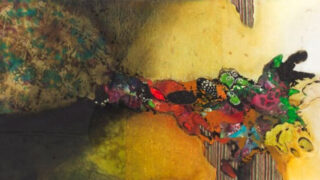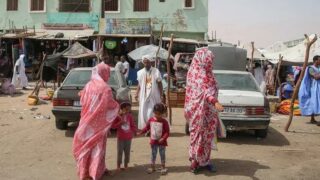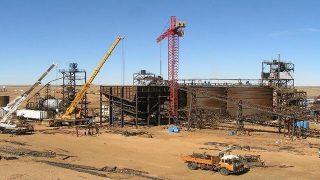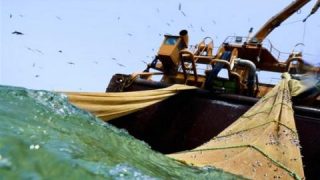Mauritania is one of the richest countries in the region in terms of fish reserves and mineral wealth as well as in terms of livestock and agricultural lands. However, these economic resources are not reflected in the miserable lives of an enduring people, satisfied with little, probably due to the fact that their own cultural existence is linked to the desert.
Fish wealth
Mauritania’s coastline along the Atlantic Ocean stretches more than 700 kilometers and encompasses one of the most important Arab reserves of fish wealth. Nevertheless, Mauritanians are still suffering from a lack of investments on their shores. According to governmental sources, these investments could supply one-quarter of fish needs in the Arab world. Moreover, official statistics indicate that fish are listed as an item in the country's public budget, at an amount of 200 million euros [$267 million]. In the absence of Arab investments, Mauritanians have started granting licenses to the European Union, allowing EU vessels to catch Mauritanian fish in return for 113 million euros [$150 million].
Minerals
Mauritania is the third largest producer of iron in the world, thanks to the mines in the north of the country near Kediet ej Jill, in Zouerat. The freight train [associated with these mines] is the longest in the world and exceeds 3 kilometers in length. It transports iron ore to the mining port in the city of Nouadhibou. It is from this port that iron ore is distributed to international markets. Moreover, Mauritania is seeking to raise its production over the next few years from 12 million tons per year to 25 million.
Furthermore, 75,000 barrels of oil are extracted per day from wells near Nouakchott, and Mauritania is also seeking to extract gas from six wells near Nouakchott. Meanwhile, eight wells are still waiting for the start of oil exploitation in partnership with the French company Total.
Mauritania exports gold from its gold mines near the city of al-Shami, about 250 km north of the capital. According to an official statement, the [national] gold company is seeking to build a plant next year capable of processing 30,000 tons of minerals per day. This will enable Mauritania to have an annual production of 830,000 ounces of gold during the next five years, under an initial investment estimated at $2.75 billion. However, the number of employees in the gold company does not exceed 7,000 workers.
Mauritania exports copper from the Guelb Moghrein Mine, located near Akjoujt to the north of Nouakchott. It is worth mentioning that the country is witnessing an unprecedented turnout of mineral exploration companies and the Mauritanian Ministry of Mines stated that it had granted 283 licenses for mineral exploration at the end of last year. Moreover, there are preparations for the extraction of uranium and other minerals. Yet, all this is not sufficient for the majority of Mauritanians, who live in dire conditions.
According to researchers’ estimation, in the capital Nouakchott, for example, whose population does not exceed one million people — one-quarter of the total population, according to the last census — around 50% of residents live below the poverty line. Some graduates, from a variety of fields, [are forced to] find work in the transportation sector. Furthermore, within the scope of a government program to combat poverty, university graduates supervise the sale of water at specific points in the slums in return for an amount not exceeding $120 a month. Moreover, recently established security companies appeal to many graduates, who are working in return for wages not exceeding $150 a month. The luckiest Mauritanians work on Spanish tomato farms in return for low wages, while tens of thousands of them have relocated to the Arab Gulf states, especially the United Arab Emirates, where Mauritanians are taking over positions as imams of mosques, religious preachers and advisers, policemen and camel breeders.
Poverty or impoverishment
Economists have attributed the reason for the impoverishment of the Mauritanian people to the ambiguity prevailing over the country’s economic policy. According to Ahmed Ould Daddah, an opposition leader and prominent economist, Mauritania — possessing 170,000 hectares of agricultural lands, enough to make it a food basket if efficient agricultural policy is adopted — suffers from a sharp food shortage. According to Daddah, slackness in dealing with exploration companies is not acceptable, since an ounce of gold in Mauritania is valued at $400, while the global price is $1,400. Daddah stressed the need to carefully examine this matter, indicating that Mauritania has large quantities of precious metals.
Mauritanians need to exploit their water
Despite having a freshwater river, Mauritania suffers from a lack of water. Ironically, the widespread poverty in the country has reached its peak in the southeast region of the country adjacent to the river, a region Mauritanians call “the triangle of poverty” due to the prevailing severe destitution. On the other hand, the programs implemented by the present government are aimed at easing the suffering of the inhabitants of this region, and the expression “triangle of hope” was proposed instead. Yet, these inhabitants suffer from the spread of the “triangle of ignorance, disease and poverty,” and oddly enough they also suffer from thirst, despite being so close to the river.
Corrupt parties in Mauritania resort to deceit to cover up their looting. While all successive governments claim they are committed to fighting corruption, none of the prisons scattered across the country detain any person on charges of usurpation of public money. While thousands work in the judiciary field — whether as judges or attorneys — and fight against economic and other crimes, Mauritanian officials often easily escape accountability, since the money they loot finds its way into Swiss or French banks. This is at times due to poor oversight, and at others to the complicity between some security authorities with corrupt parties. In this respect, Mauritanians scoff at some officials because of overly inflated bills disclosed after a military coup. For example, a minister spent over $1 million on a dinner party held for a ministerial delegation of less than six ministers.
However, even though corrupt persons are rarely held in custody, an officer was arrested a few weeks ago for having carried out a corrupt commercial transaction for the construction of a sports stadium at a value of 2.5 billion Mauritanian ouguiya [$8.28 million]. The latter’s wife, the sports minister, was dismissed and the director general of the transactions department and a businessman were also arrested. It is often said that there is a group of six people who have taken hold of the country’s resources and are using them for their personal interests. This group assumes the mission of overseeing the disbursement of 1.5 trillion ouguiya [$4.97 billion], without that disbursement reflecting positively on the lives of citizens.
While the opposition accuses the ruling authorities of being involved in corruption and of awarding projects based on compromise rather than through the usual bidding process, the opposition is also accused of participating in corruption and its own enrichment after some of its leaders came to power.
Translated by Al-Monitor





